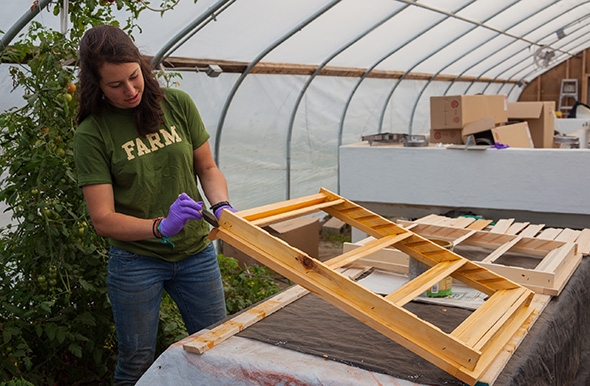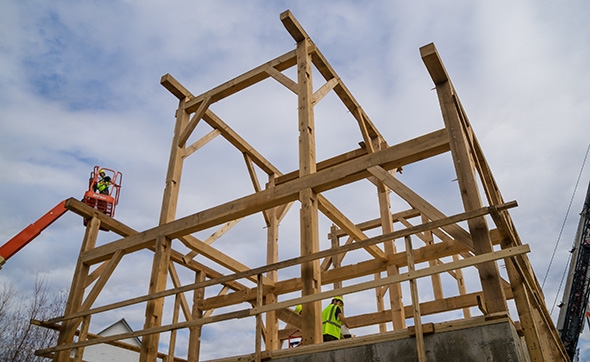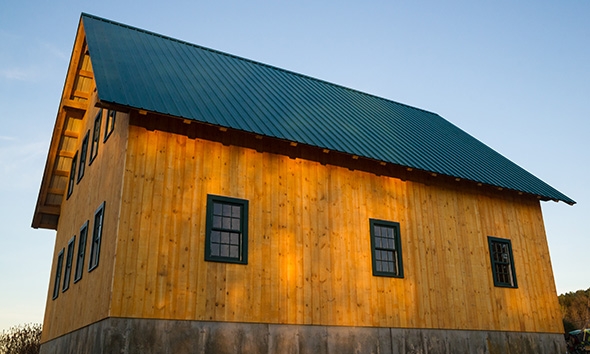When it was time to replace the old barn at the Dartmouth Organic Farm, the decision was made to not simply build a barn, but to use the opportunity to build community as well. And so arose the idea for a barn raising that would engage students and the Dartmouth community at the farm and bring greater awareness to the sustainability efforts that are happening across campus.
“There are a lot of ways to solve the problem of needing a barn,” says Rosi Kerr ’97, director of Dartmouth’s Sustainability Program, “but we chose to do it in a way that engaged students. We wanted the project itself to build community around the farm and to build energy around sustainability and all of the things that we’re doing, and it’s done that.”
Nestled along the banks of the Connecticut River, three miles north of campus on Route 10, the 200-acre Organic Farm is home to vegetable gardens, solar greenhouses that contain tanks for raising fish and studying aquaponics, and a forest of maple trees tapped for maple syrup. And now there’s a new 24-foot by 36-foot traditional timber frame barn.
While the new barn will serve the practical purpose of providing a space to sort and store vegetables and house farm equipment, it also represents the future of the farm and the future of sustainability at Dartmouth, says Kerr. “This is much more about where we are headed, than it is just about a barn.”
Scott Stokoe, manager of the farm, and adjunct instructor of environmental studies, says the new barn represents a point of departure for the farm, and provides an opportunity to expand the academic opportunities and student experiences that the farm already provides. “We see this as the beginning of a whole new way to think about the Dartmouth community connecting to all 200 acres here—rather than just a new barn to store more broccoli.”

The farm, Stokoe says, “is the place where students can engage their hands with their work and a place where we continue the academic concepts and put tools in their hands. This is a place where students can have an ongoing connection to actual systems on the ground.”
Focus on Sustainability
“Sustainability is about constant evolution and this barn is an example of one way to approach that challenge, the challenge of building things more sustainably. It’s not perfect, but it’s a great start,” says Kerr.
Using local materials and local labor was an important part of the project. The barn’s hemlock timber frame was milled in West Newbury, Vt. Additionally, the barn was situated and wired so that it can support solar power in the future.
“We didn’t build a disposable building, we built a lasting building,” says Kerr.
The barn raising project was a community effort organized by the Dartmouth Sustainability Program and the Dartmouth Organic Farm, with the support and funding from the Dean of the College division and the Facilities Operations and Management department.
Planning for the barn began nearly a year ago, says Tim McNamara, Dartmouth’s associate director of real estate. Dartmouth partnered with TimberHomes LLC, based in Vershire, Vt., on the build.
“We found a local company that had a strong commitment to place, a strong commitment to sustainability, and a strong commitment to heirloom quality construction,” says Kerr. “The company was a great partner, willing to work with our students and have education be part of the project,” Kerr adds.
TimberHomes has worked with Dartmouth before, designing and constructing the timber frame bunkhouse at Moosilauke Ravine Lodge, a project that also included student and alumni volunteers.
Getting to Work
After the construction crew from TimberHomes raised the traditional timber frame on October 25, members of the Dartmouth community got to work on finishing the two-week barn project. Over the course of the construction, approximately 50 volunteers—including students, alumni, faculty, and staff—lent a hand by raising the stairs, cutting siding, installing insulation, painting windows, and much more.

Experience levels among the volunteers varied. While some had a deep connection to the farm—such as the members of the Organic Farm Club who work at the farm—others, including Veri di Suvero ’16, were newcomers.
One of the project’s work crew leaders, di Suvero, from New York City, was excited to take on a new challenge. “I never built a barn before or done anything remotely close to it. I thought it might be nice for a city girl to get out and learn to do something with her hands,” she says.
For Organic Farm Club member Danielle Nathanson ’13, being involved in the barn project from start to finish was exciting. “Watching the vision play out was incredible,” says the environmental studies major from Pittsburgh, Pa. “Everyone really seemed to enjoy the collaborative effort of making something meaningful with their hands, which is what I enjoy about farming.”
In addition to working in the fields and learning about the daily operations of the farm, Krystyna Oszkinis ’14—the Organic Farm’s student intern—also helped with the barn project. “It’s a really exciting time for this land and for the farm program,” says Oszkinis, an environmental studies major with a minor in Native American studies from West Islip, N.Y.

A Reason to Celebrate
To celebrate the completion of the barn, students, alumni, Dartmouth community members, and TimberHomes crew members gathered at the Organic Farm on November 10 for a barn raising party.
During the evening’s festivities, Kerr offered words of thanks to those involved in the project before turning her attention to what the successful completion of the barn signifies and what the future holds for sustainability at Dartmouth. “I hope it [the new barn] is the spark that lights a fire that moves Dartmouth to sustainability leadership, not just here, not just in the Upper Valley, but in the world,” she told the crowd of approximately 100.
Sam Kernan ’14, a farm club member and geography major from Rochester, N.Y., also addressed the crowd at the celebration. “Any work undertaken well ought to be celebrated, and this certainly has been undertaken very well,” he said.
Enjoying hand-pressed cider, the warmth of a bonfire, and a view of the new timber barn illuminated by the sun setting on the river, the crowd cheered as Dean of the College Charlotte H. Johnson congratulated those involved in the project. “You have raised a barn, now I want you to ‘raise the roof’ of sustainability,” said Johnson.
